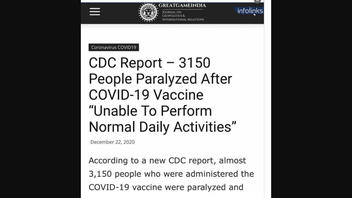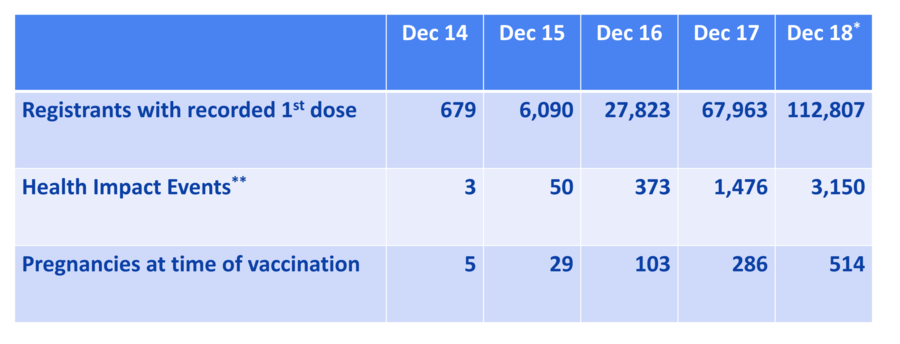
Were 3,150 people "paralyzed" after receiving a COVID-19 vaccine? No, that's not true: That figure represents the number of people who reported a health impact event. Such an event is defined by the U.S. Centers for Disease Control (CDC) as when someone experiences at least one of three issues: unable to perform normal daily activities, unable to work and/or required care from a doctor or health care professional. Common side effects of the COVID-19 vaccine, including pain, swelling, fever and tiredness, may affect the recipient's ability to participate in daily activities. They are "normal signs that your body is building protection" and should not last longer than a few days, according to the CDC. Severe side effects are rare.
The claim appeared in an Instagram post (archived here) published on December 30, 2020. It included an introductory message that read: "Go ahead if you want but not me!" It also included a screenshot of a news story from greatgameindia.com. That story, titled "CDC Report -- 3150 People Paralyzed After COVID-19 Vaccine 'Unable To Perform Normal Daily Activities,'" opened:
According to a new CDC report, almost 3,150 people who were administered the COVID-19 vaccine were paralyzed and were 'unable to perform normal daily activities, unable to work and required care from doctor or health care professional.'
Users on social media saw this:
The post was referring to a publicly available CDC presentation, dated December 19, 2020, that looked at data from the CDC's new vaccine safety monitoring system known as V-safe. V-safe is a smartphone-based tool that uses texts and surveys to check in with vaccine recipients following COVID-19 vaccination.
The full CDC presentation can be seen here. The relevant graphic, found on slide six, is pasted below:
As can be seen, 3,150 people among the 112,807 who registered with V-safe reported "health impact events." That's not the same as people reporting being paralyzed.
Lead Stories reached out to the CDC for further clarification on what exactly that 3,150 figure represents. Spokeswoman Kristen Nordlund responded via email. She wrote:
One of the questions V-safe asks is whether the symptoms you reported today caused one of the following:
- unable to perform normal daily activities,
- unable to work, and/or
- required care from doctor or health care professional
The number that was reported in the slides represented the number of people who, through V-safe, have indicated their symptoms caused one of the above issues.
Nordlund added:
We anticipate anyone getting vaccinated may have some side effects, which are normal signs that your body is building protection. These side effects may affect your ability to do daily activities, but they should go away in a few days.
She did not provide a breakdown of what symptoms the people who reported health impact events experienced.
Common side effects of the COVID-19 vaccine may include pain, swelling, fever, chills, tiredness and headache. Severe side effects are rare. For more information on what to expect after getting a COVID-19 vaccine, watch this CDC video, which stresses many of the same points Nordlund made:
Side effects after getting a #COVID19 vaccine are normal signs your body is building protection. Side effects may even feel like flu and might affect your ability to do daily activities, but they should go away in a few days. Watch to learn more: pic.twitter.com/huQ3xNXo5n
-- CDC (@CDCgov) December 15, 2020
NewsGuard, a company that uses trained journalist to rank the reliability of websites, describes greatgameindia.com as:
An Indian news and politics site that has promoted false and unsubstantiated health care conspiracy theories.
According to NewsGuard the site does not maintain basic standards of credibility and transparency. Read its full assessment here.


















